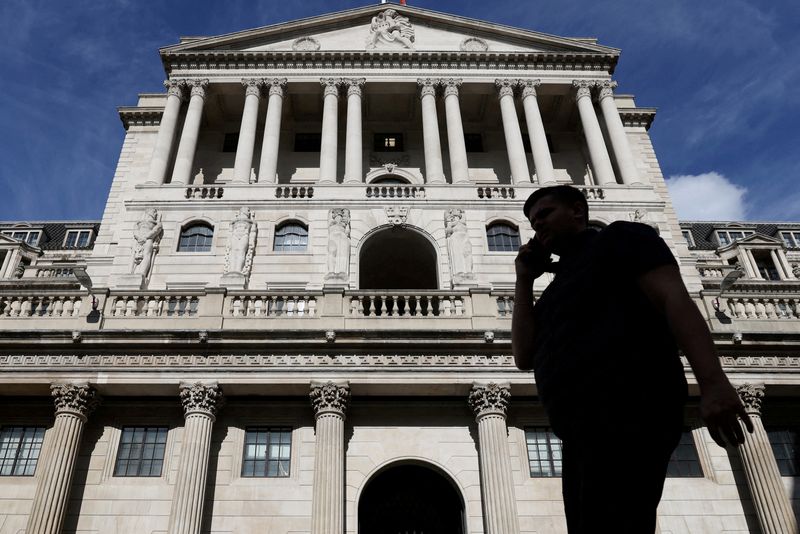LONDON (Reuters) - The Bank of England kept interest rates steady on Thursday, with officials split three ways on the right course for policy.
Six out of nine members of the BoE's Monetary Policy Committee voted to keep rates at a 15-year high of 5.25%.
Jonathan Haskel and Catherine Mann voted for a 0.25 percentage-point hike, while Swati Dhingra voted for a cut of the same size. It marked the first time since August 2008 that different policymakers have voted to move interest rates up and down at the same meeting.
MARKET REACTION:
BONDS: Britain's 2-year gilt yield rose and was last trading at 4.28%, up from 4.24% just before the rate decision. Ten-year yields were at 3.83%, versus 3.79% earlier, and up around 3 basis points on the day.
Money markets price in a roughly 50% chance of a quarter point rate cut in May down from a more than 60% chance earlier in the day.
FOREX: Sterling was last down 0.2% against the dollar at $1.2663, compared with $1.2635 before the decision. It was at 85.38 per euro, versus 85.58 pence earlier.
STOCKS: London's FTSE-100 trimmed its gains and was last up around 0.3% on the day.
COMMENTS:
FIONA CINCOTTA, MARKET STRATEGIST, CITY INDEX, LONDON:
"I think that vote was a bit more hawkish than what we were expecting and I understand inflation is still sticky. But it does feel like they’re pushing back quite strongly still – at least two are - on the prospect of a rate cut."
"Given what we’ve seen from the state of the economy, in the sense that we’ve seen retail sales dropping, we are seeing the manufacturing sector is still in contraction. But the service sector is still relatively strong, the labour market is holding up, service sector PMIs are still in expansionary territory and inflation is still double the Bank of England’s target, that (could be) what those two members are focusing on."
"The market isn’t necessarily paying huge amounts of attention to the meeting. The pound has been rangebound for quite some time around that $1.27 level and it feels like it is still waiting for a little bit more confirmation from the Bank of England about the timing of the move."
JANE FOLEY, HEAD (LON:HEAD) OF FX STRATEGY, RABOBANK, LONDON:
"I think the market is very focused on the voting pattern and that two members still voting for a hike, has led the market into thinking that there was a slightly hawkish element. If you remove the voting pattern much of the rhetoric is fairly unsurprising."
"The market is going to want to know why they have changed their language to take out the risk that more hikes may be needed while there are two members voting for a hike, what signal does the market need to take from that?"
"Market place a lot of store on the voting patterns and that is often the source of confusion. We don’t see this for other central banks, the fact that we do often raises more questions than answers."
KYLE CHAPMAN, FX MARKET ANALYST, BALLINGER & CO, LONDON
"While the ECB and the Fed are hinting at rate cuts, the Bank of England’s reticence for these discussions continues to make it stand out as an outlier. The most interesting point for us is the expectation that inflation will soon temporarily reach the 2% target before reaccelerating - this suggests that a sharp fall in inflation in the near-term may be less impactful on policy than we would have thought previously."
"The materialisation of this forecast would entail holding policy firm despite 2% inflation prints, and then cutting rates later in the year while inflation is rising. We have doubts that the MPC would be able to credibly hold their nerve and not start cutting in this scenario."
PETER SCHAFFRIK, GLOBAL MARKET STRATEGIST, RBC CAPITAL MARKETS, LONDON:
"The long and the short of it is that they (the BoE policymakers) are moving slowly and steadily away from a hawkish stance. There was one vote for a cut."
"The text suggests the views are balanced, but not as hawkish as it used to be."
PHILIP SHAW, CHIEF ECONOMIST, INVESTEC, LONDON:
"The fact that two members are still voting for higher rates suggests that there is no material, immediate momentum to lower rates and the inflation projections implicitly show that the committee as a whole believes that the speed of rate cuts implied by yield curve has been too rapid."
"We stand by our baseline call that the committee will begin to ease in June, but this is of course subject to data over the next few months. Furthermore the fact that the MPC is very divided is a good pointer to the prevailing uncertainty."
JEREMY BATSTONE-CARR, STRATEGIST, RAYMOND JAMES, FRANCE:
"It appears there no longer exists a firm commitment to keep rates at levels restrictive to economic activity. However, rate-setters are likely to tread warily and will wait to see confirmation that inflation has resumed its downward pathway before committing to policy easing."
"While the exact timing of the first rate cut remains in doubt, the point at which monetary policy is finally loosened is probably not all that far away."
DAVID MORRISON, SENIOR MARKET ANALYST, TRADE NATION, LONDON:

"What is really interesting is the voting. We got two voting for a hike and one for a cut. For two members to still be going for a rate hike, that does say to me that rates aren’t coming down any times soon particularly. I would have expected more of a shift."
"There is still that hawkishness at the Bank and I think it’s kind of justified. Inflation is far too high in the UK and far too sticky and is taking far too long to shift downwards."